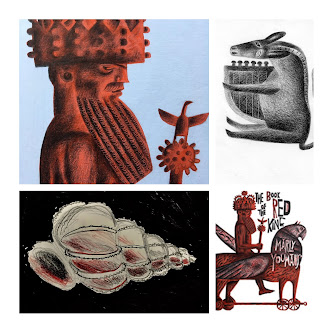 |
| Illumination by Clive Hicks-Jenkins Pb available via indies, Amazon etc. Hc & pb available via Phoenicia Publishing |
I have read The Book of the Red King. It is an extraordinary work. It put me in mind of how much I enjoyed Yeats’s early fairyland poems. The poems remain steadfastly otherworldly. They transport the reader to an existence apart. I’m reminded of James’s definition of a romance vs. a novel. In the former the writer cuts the lines that tether the fiction to the earth. Seems to me you do, but there are occasional details that let us know that you know there’s a world below, one more familiar to us and one with real pain. I found this in pages 102-109 and liked the modulation of tone. The poems have their own rich mythology, but I appreciated the slant or even explicit references to Christianity—grail, baptismal basin, baptism by fire, phoenix and no doubt others. The language of the work is rich and often exotic. I especially, though, responded to the varied rhythms. I’m no good at prosody, but I think I found lots of variety—iambic regularity, heavy beats approaching Old English strong stress, and long liquid melodious lines and no doubt more. I especially admire your frequent use of enjambment and the way it moves us across lines. Also stanza forms and a great variety of line breaks.
Some more thematic things. I was often wondering, does the Fool have a self or is he just a pastiche of jester-like roles. On page 27, in an especially beautiful poem, is an image of wholeness in a face even as it’s broken by sunlight and water. This is reassuring. At the bottom of page 111 the matter is in doubt. In “The Silver Cord” an even deeper doubt arises—the specter of nothingness. “We are such stuff as dreams are made on.” Which reminds me that your allusions—Shakespeare, Milton etc. are always apt. So if the book is really the King’s and not the Fool’s (P.127), a proposition not easily accepted given the space given the Fool, then the Fool’s ontological status is one of total dependency. On what? Some God-like presence, or something less? Meanwhile, eternity winks at us. On page 44 we learn that wentletrap can sing a song of endlessness and thus potentially liberate the world of the Fool from time and change. And in the wonderful “Great Work of Time” we have some assurance that our microcosmos is indeed a miniature of a greater cosmic reality. But at the End of “Fool’s Sacrifice,” in a rare moment of metapoetry, we must face the possibility that the whole book is just words and nothing more. Or an art critic might say the book is painterly, its brilliant surfaces defying a downward gaze. Thus, much is left in the balance, not to be resolved in this book or in life.
This is as far as I can go except to say that I think “Raven Castle” is a masterpiece.
* * *
Portion of a letter,
shared by permission of Eugene Garber.
No comments:
Post a Comment
Alas, I must once again remind large numbers of Chinese salesmen and other worldwide peddlers that if they fall into the Gulf of Spam, they will be eaten by roaming Balrogs. The rest of you, lovers of grace, poetry, and horses (nod to Yeats--you do not have to be fond of horses), feel free to leave fascinating missives and curious arguments.